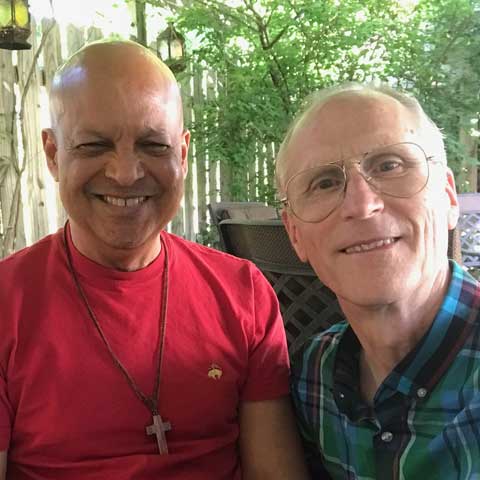Personal Perspective: The Storm

As Superstorm Sandy battered the east coast, one man had a stroke. Luckily his partner was there to rescue him.
By Grace Wells, Research Coordinator, Center for Neuropsychology and Neuroscience Research, Kessler Foundation
We often think of fate as pre-determined destiny or an event occurring outside of our control. In the Fall of 2012, when Superstorm Sandy battered New Jersey, fate took hold of the lives of Porfirio (Porfi) Garcia and Lee Kimble. Porfi, who was living alone on the coast, felt it was safer to travel to Manhattan to stay with his partner Lee. That was when Porfi had a stroke – and Lee immediately rushed him to St. Luke’s Roosevelt Hospital for treatment. Had he not decided to join Lee in the city, Porfi would have been stranded in the midst of a devastating hurricane, his outcome uncertain.
Upon discharge from the hospital, Porfi was transferred to Kessler Institute for Rehabilitation in West Orange, NJ, for acute rehabilitation. He was grateful for the care and encouragement of his team of nurses, therapists and other stroke rehabilitation specialists, led by physiatrist Mylan Lam, M.D. Although he was occasionally frustrated having to relearn daily tasks, Porfi remained positive and was buoyed by the support of friends and family.
Porfi continued his recovery through outpatient therapy at Kessler Institute and still schedules regular check-ups with Yekyung Kong, M.D.
Immediately following Porfi’s “brain attack,” Lee began researching how best to care for his partner. He also gained great insight and strategies from the rehabilitation team, and came to understand how crucial it is to work toward restore pathways in the brain as soon as possible. Lee and Porfi also participated in Kessler Institute’s support group, where they learned about a program called Opportunity Project.
Located in Millburn, NJ, Opportunity Project helps brain injury survivors explore their strengths and abilities and transition to life ahead with as much independence as possible. The program runs a wide range of individual and group activities throughout the day, such as work assistance, music, cooking, and general therapy to build physical, cognitive and social skills. Porfi benefitted greatly from working the program’s trained personnel and interacting with his peers, noting a marked improvement in function.
Today, Porfi’s daily motivation is to live life to the fullest. He relies on the practices he has learned over the years to be as independent, confident and comfortable as possible. Both he and Lee praise New Jersey’s vast resources and accessible venues. Much like the storm that changed their lives forever, Porfi continues to be a force of nature, giving every day his best.
